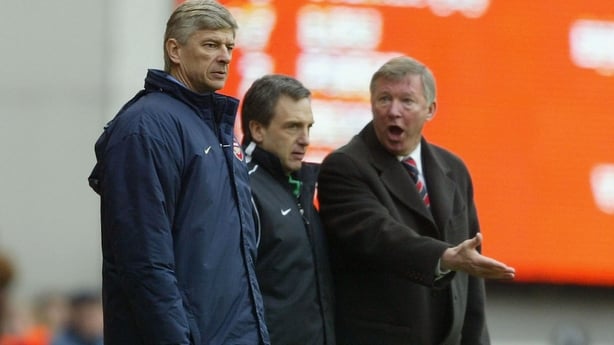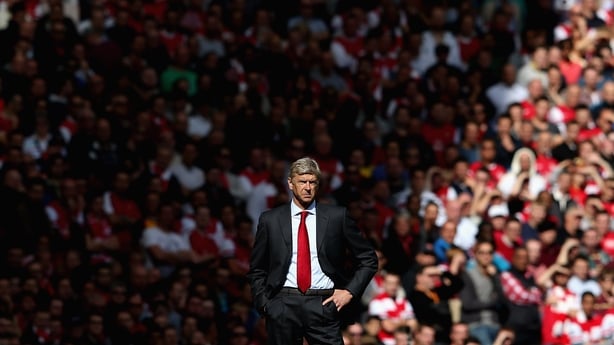Arsene Who? The London Evening Standard certainly weren’t impressed when it was announced that a relatively unknown Frenchman was to be Bruce Rioch’s replacement as Arsenal manager back in 1996.
Back then Wenger’s credentials did little to assuage doubters that he’d be nothing than another footnote in the club’s history.
An undistinguished playing career was followed by managerial spells in France with Nancy and Monaco before he left for Japan to manage Nagoya Grampus Eight, a side who to this day are still best known for being the team that Gary Lineker chose to end his career with, in return for big bags of yen.
Wenger took charge of Arsenal at a low point for the club. Their hugely successful manager George Graham had been sacked for taking bungs from an agent before his successor, Rioch, left just one year into his contract following a bust-up with the board.
Expectations were low when Wenger came in and he didn’t endear himself to the playing staff when he immediately set about dismantling the drinking culture at the club.
Gone were the ‘Tuesday Club’ antics of the Graham era, and in came strict diets that were, up until then, more associated with endurance sports such as marathon running and cycling.
Wenger overhauled the training routines at Highbury too, standing on the sidelines of training pitches with a stopwatch as he timed shorter, sharper training sessions with much less focus on running laps and more attention paid to seemingly minor things like stretching.
All this coincided with the fledgling Premier League era and Sky Sports, who had spent hundreds of millions on rebranding what had been the muddy old English League Division One to the new, exciting and sexy Premiership.
In Wenger they found the perfect manager to hang their new modern image upon and his new look Arsenal side would become everything that they needed to sell the idea of a fresh era.
While the likes of Gerry Francis, Joe Kinnear and Joe Royle were standing on the sidelines in their fading track-suits and rapidly greying mullets, here was an elegant besuited Frenchman who wore glasses and looked just as likely to quote Sartre as to scream ‘just kick it up to t’big lad’.
This new continental manager went about rebuilding the Arsenal squad in his image and out went the likes of Paul Dickov and Eddie McGoldrick to be replaced by young French players Patrick Vieira and Nicolas Anelka.
Not everyone was impressed of course and Manchester United manager Alex Ferguson famously dismissed Wenger’s new approach shortly after he arrived, sneering: "He has no experience of English football, he has come from Japan and he’s now telling everyone in England how to organise their football."
"...he's come from *******JAPAN******" pic.twitter.com/5FyCfK7gPJ
— Adam Hurrey (@FootballCliches) April 20, 2018
However, with the Premier League and the new found wealth that the Sky Sports television deal had brought, English football was changing and Wenger was at the vanguard of a new approach that would force other managers not just to adapt but to replicate his approach to keep pace with that change.
Wenger’s first season started brightly but a poor Christmas period, followed by a fallow February saw them eventually finish in third place behind Champions Manchester United and Kevin Keegan’s Newcastle.
Ferguson had not only seen off the challenge of Keegan after his famous ‘I would love it’ rant, but he’d also put Johnny Foreigner back in his box with his new fancy ideas.
That wouldn’t last however and the rivalry that was to come to define the new Premier League era began in earnest the following season with Wenger’s Arsenal beating United to the league title by a single point.
Wenger continued his rebuilding in the closed season and it involved shipping out more English players in favour of their European counterparts. Paul Merson, Matthew Rose and Ian Selley were all moved on, replaced by the in-coming Emmanuel Petit, Marc Overmars and Luis Boa Morte.
All the while Wenger continued to transform the culture at Arsenal as it became a teetotal club with their players beginning to act like athletes rather the footballers of old who’d stop the club coach at a chipper on the way back from an away game.
This was cutting edge football hipster stuff at the time and it paid dividends on the pitch as Arsenal refined the swash-buckling attacking football that Wenger had introduced in his first season and added a new-found steel in midfield with Petit and Vieira bossing teams and outmuscling them.
A league and cup double in his first full season at Highbury had other teams scrambling to replicate his success and suddenly foreign players and managers were in vogue as Wenger opened the door for the likes of Gerard Houllier at Liverpool and Claudio Ranieri at Chelsea.
But while other managers may have benefitted from Wenger’s success it left his counterpart at Old Trafford seething and hungry for revenge.
Ferguson would get that revenge, beating Wenger’s Arsenal to the Premier League on the final day by a point, and he went on to lead United to three consecutive titles before Wenger could wrestle it back from him in the 2001/02 season.

Wenger completed a second league and cup double that season and he succeeded in really getting under the skin of Ferguson, who sniped and moaned about his Arsenal counterpart throughout the season, bemoaning everything from Arsenal’s confidence to Wenger’s lack of enthusiasm for a post-match drink.
From there on out the relationship devolved into one of spite and disdain and it made for great television, leaving the Premier League and Sky Sports rubbing their hands with glee.
From the ‘Battle of Old-Trafford’, where Arsenal hung on to their Invincibles tag with Ruud Van Nistelrooy missing a late penalty, to ‘Pizzagate’ when Cesc Fabregas pelted Ferguson with a pepperoni slice, the enmity between the clubs and managers grew and captured the imagine of the public.
Relations between Wenger and Ferguson thawed in later years as the two elder statesmen of the league came to admit a grudging respect for each other but Wenger remained and still remains fiercely defensive of the club that he helped in many ways to build.
Overseeing the move from the move from Highbury to the Emirates was not a task that many would envy and it arguably cost him trophies as he found his budget constrained and his ambitions to bring the biggest and best players to Arsenal limited.
Shareholder Alisher Usmanov insists that Wenger sacrificed personal glory for the Arsenal cause and personally suffered because of the stadium him.
"Arsene had a very, very difficult position when club shareholders didn't want to put their money into constructing the new stadium. Because of this, he (went) five years - maybe the best of his career - without a trophy. Ten years, in reality."
However, Wenger has been unwavering in his loyalty to Arsenal, so much so that his myopic version of on-pitch events has become something of a cliché.

Forever loathe to criticise his players, Wenger’s claims of ‘I did not see the incident’ crossed the line from the ridiculous to the comedic sometime back around the mid-2000s and while he has often made himself look foolish for defending the indefensible, it speaks to both his loyalty to his players and his club.
From being criticised for working in Japan by Ferguson to being abused on YouTube, Wenger's reign began in one Premier League and ended in another. A 'company man' in the best meaning of the phrase, his dedication to the Gunners cause seems almost romantic when compared to his peers who frequently 'leave by mutual consent' only to pop up elsewhere quicker than you can say "statement released via the LMA".
Which is why it’s time for the Arsenal players to repay him and send him off with the one thing that has eluded him during his time in charge of the club - a European trophy.
Wenger’s record of 20 consecutive seasons in the Champions League is worth trumpeting about from a financial point of view but it’s not exactly something you can parade through the streets of London.
Defeat to Barcelona in the 2006 Champions League final is as close as Wenger has come to lifting European silverware and while the Europa League is a step down from the competition in which Arsenal had been a mainstay, lifting it would be a fitting send-off for a manager who not just helped define the Arsenal of the modern era, but helped to create them and the Premier League.


